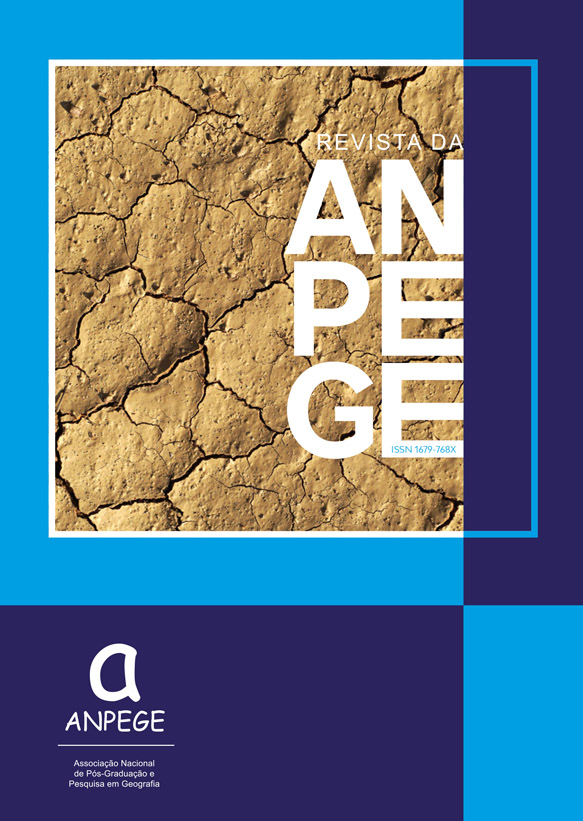Land grabbing, financeirização da agricultura e mercado de terras: velhas e novas dimensões da questão agrária no Brasil
DOI:
https://doi.org/10.5418/ra2020.v16i29.12506Palavras-chave:
financeirização da agricultura, questão agrária, land grabbing, açambarcamento de terras, mercado de terras, estrutura fundiáriaResumo
A virada do século XXI na América Latina esteve associada a um novo consenso em torno das commodities e ao reforço de dinâmicas de expropriação ou despossessão. No Brasil esse período correspondeu à consolidação de uma economia política do agronegócio e à expansão dos projetos extrativos no campo. Essa nova conjuntura renovou e reforçou dinâmicas de concentração fundiária, colocando novos desafios para a questão agrária brasileira. O artigo avança na análise de três dimensões estratégicas: a crescente financeirização da agricultura que impulsiona a expansão do agronegócio; os processos de financeirização e estrangeirização da terra e a conformação de uma nova governança global dos negócios com terra e o acirramento dos conflitos territoriais. As reflexões resultam das discussões e estudos realizados no âmbito do Grupo de Estudos sobre Mudanças Sociais, Agronegócio e Políticas Públicas (GEMAP) da Universidade Federal Rural do Rio de Janeiro (UFRRJ).
Downloads
Referências
AGENCIA PUBLICA. O Agro é branco. 2019. Disponível em: https://apublica.org/2019/11/o-agro-e-branco/. Access jan. 2020.
BARROS Jr., O. A. A mercadorização de terras agrícolas na região do MATOPIBA e as flutuações de preços. Rio de Janeiro: CPDA/UFRRJ. Mimeo. 2020.
BORRAS, S. M.; FRANCO, J.; WANG, C.. The Challenge of Global Governance of Land Grabbing: Changing International Agricultural Context and Competing Political Views and Strategies, Globalizations, 10:1, 2013. Pp. 161-179. DOI: https://doi.org/10.1080/14747731.2013.764152
BORRAS, S. M.; KAY, C.; GOMEZ, S. & WILKINSON, J. Land grabbing and global capitalist accumulation: key features in Latin America, Canadian Journal of Development Studies/Revue canadienne d'études du développement, 33:4, 2012. Pp. 402-416. DOI: https://doi.org/10.1080/02255189.2012.745394
BRUNA, N. Land of Plenty, Land of Misery: Synergetic Resource Grabbing in Mozambique. Land 2019, 8: 113, 2019. Pp. 2-16. DOI: https://doi.org/10.3390/land8080113
CANUTO, A.; LUZ, C. R. Da S.; SANTOS, P. C. M. dos (org.). Conflitos no Campo 2019. Goiânia: CPT Nacional, 2020.
CANUTO, A.; LUZ, C. R. Da S.; SANTOS, P. C. M. dos (org.). Conflitos no Campo 2018. Goiânia: CPT Nacional, 2019.
CANUTO, A.; LUZ, C. R. Da S.; SANTOS, P. C. M. dos (org.). Conflitos no Campo 2017. Goiânia: CPT Nacional, 2018.
CANUTO, A.; LUZ, C. R. Da S.; SANTOS, P. C. M. dos (org.). Conflitos no Campo 2016. Goiânia: CPT Nacional, 2017.
CANUTO, A.; LUZ, C. R. Da S.; SANTOS, P. C. M. dos (org.). Conflitos no Campo 2015. Goiânia: CPT Nacional, 2016.
CANUTO, A.; LUZ, C. R. Da S.; SANTOS, P. C. M. dos (org.). Conflitos no Campo 2014. Goiânia: CPT Nacional, 2015.
CLAPP, J. Financialization, Distance and Global Food Politic. Presented at the International Conference on Food s Sovereignty: a critical dialogue. United States: Yale University, 2013.
CLAPP, J. Responsibility to the rescue? Governing private financial investment in global agriculture. Agriculture Human Values. 2016. Pp. 1-13. DOI: https://doi.org/10.1007/s10460-015-9678-8
CONAB. Série Histórica de Produção. 2020. Disponível em: http://www.conab.gov.br. Acesso em: 20 fev.
DEININGER, K.; BYERLEE, D. Rising Global Interest in Farmland: can it yield sustainable and equitable benefits? Washington: World Bank, 2011. DOI: https://doi.org/10.1596/978-0-8213-8591-3
DELGADO, G. C. Especialização primária como limite ao desenvolvimento. Desenvolvimento em Debate. V.1, n. 2, 2010. Pp. 111-125. DOI: https://doi.org/10.51861/ded.dmez.2.011
DELGADO, G. C. Do capital financeiro na agricultura à economia do agronegócio. Porto Alegre: Ed. UFRGS, 2012.
DUCASTELL, A. e ANSEEUW, W. Investissements fonciers à grande échelle et financiarisation de l’agriculture: une analyse par les filières agrofinancières. In.: Allaire, Gilles; Daviron, Benoit (coord.). 2017. Transformations Agricoles et Agroalimentaires. Versailles: Editions Quae.
EDELMAN, M. Messy hectares: questions about the epistemology of land grabbing data, The Journal of Peasant Studies, 40:3, 2013. Pp. 485-501. DOI: https://doi.org/10.1080/03066150.2013.801340
EDELMAN, M.; BORRAS, J. Political Dynamics of Transnational Agrarian Movements. Estados Unidos: Fernwood Publisching, 2016. DOI: https://doi.org/10.3362/9781780449142.000
FAIRBAIRN, M. Just Another Asset Class? Neoliberalism, Finance and the Construction of Farmland Investment. In.: WOLF, S. A.; BONANNO, A. The Neoliberal Regime in the Agrifood Sector: crisis, resilience and restructuring. Estados Unidos: Routledge, 2014.
FAIRBAIRN, M. Like Gold with Yield: evolving intersections between farmland and finance. The Journal of Peasant Studies, 41: 5, 2014. Pp. 777-795. DOI: https://doi.org/10.1080/03066150.2013.873977
FEDERICI, S. Women, Land Struggles and the Construction of the Commons. Working USA, volume 14, número 1, 2011. DOI: https://doi.org/10.1111/j.1743-4580.2010.00319.x
FLEXOR, G.; LEITE, S. P. Land Market and Lan Grabbing in Brazil during the Commodity Boom of the 2000s. Contexto Internacional, 39(02), may/ago 2017. DOI: https://doi.org/10.1590/s0102-8529.2017390200010
GOMES C.M.P., Financeirização da terra e poder corporativo na “última” fronteira agrícola – Matopiba (Projeto de Qualificação de Tese de Doutorado), Rio de Janeiro, CPDA/UFRRJ, 2017.
GRAIN. Seized! The 2008 land grab for food and financial security. Grain briefing, 2008.
GRAIN and REDE SOCIAL DE JUSTIÇA E DIREITOS HUMANOS. Harvard's billion-dollar farmland fiasco, São Paulo: GRAIN and Rede Social de Justiça e Direitos Humanos, 2018.
GRAS, C. HERNANDEZ, V. Radiografia del Nuevo Campo Argentino: del terrateniente al empresário transnacional. Buenos Aires: Siglo Veintiuno Editores, 2016.
GRAS, C., NASCIMENTO, R.C. Monopólio de terras e capital financeiro: a atuação da empresa Cresud na América Latina, in Bernardes J.A., Frederico S., Gras C., Hernandez V., Maldonado G. (coord.), Globalização do agronegócio e land grabbing: a atuação das megaempresas argentinas no Brasil, Rio de Janeiro, Lamparina, p. 118-134, 2017.
HARVEY, D. O “novo” Imperialismo: acumulação por espoliação. Nova Iorque: Oxford, 2003.
HARVEY, D. The 'New' Imperialism: Accumulation by Dispossession, Socialist Register, vol. 40, p. 95-125, 2004.
HIGH QUEST PARTNERS. Private Financial Sector Investment in Farmland and Agricultural Infrastructure, OECD Food, Agriculture and Fisheries Working Papers, No. 33, OECD Publishing, 2010.
HOFFMANN, R. A Distribuição da Posse da Terra no Brasil, com Resultados Preliminares para 2017. 57o Congresso da Sociedade Brasileira de Economia, Administração e Sociologia Rural. Ilhéus: SOBER, 2019.
KNUTH, S. Global Finance and the Land Grab: mapping twenty-first century strategies. Revue cannadienne d’études du développment, volume 36, numero 2, 2015. DOI: https://doi.org/10.1080/02255189.2015.1046373
LAND MATRIX. Brazil: Map, s.l.: The Land Matrix, 2020.
LEVIEN, M. Da acumulação primitiva aos regimes de desapropriação. Sociologia e Antropologia, v. 04, n. 01, p. 21-53, jun. 2014. DOI: https://doi.org/10.1590/2238-38752014v412
MATTEI, L. O debate sobre a reforma agrária no contexto do Brasil rural atual. Política e Sociedade, volume 15, edição especial. 2016. Pp. 234-260. DOI: https://doi.org/10.5007/2175-7984.2016v15nesp1p234
MEDEIROS, L. Conflitos Fundiários e Violência no Campo. In.: CANUTO, A.; LUZ, C. R. Da S.; SANTOS, P. C. M. dos (org.). Conflitos no Campo 2014. Goiânia: CPT Nacional, 2015.
OXFAM, Desterrados: tierra, poder y desigualdad en America Latina, Oxford, Oxfam Internacional America, 2016.
PALMEIRA, M.; LEITE, S.P. Debates econômicos, processos sociais e lutas políticas. In: COSTA, L.F., SANTOS, R. (orgs.) Política e reforma agrária. Rio de Janeiro: Mauad, 1998.
PREQIN. Preqin Special Report: Agriculture. 2016. Disponível em: http://docs.pre qin.com/reports/Preqin-Special-Report-Agriculture-September-2016.pdf. Acesso em 13 january 2020.
PREQIN. Preqin Special Report: The natural resources Top 100, New York: Preqin, 2017.
RANGEL, I. A questão da terra, Revista de Economia Política, vol. 6, n°4, out./dez., p. 71-77, 1986. DOI: https://doi.org/10.1590/0101-31571986-4071
SASSEN, S. Land Grabs Today: Feeding the Disassembling of National Territory, Globalizations, 10:1, 2013. Pp. 25-46 DOI: https://doi.org/10.1080/14747731.2013.760927
SASSEN, S. Expulsões: brutalidade e complexidade na economia global. Angélica Freitas (trad.). Rio de Janeiro/São Paulo: Paz e Terra, 2016.
SAUER, S.; BORRAS Jr., S.J. Land Grabbing and Green Grabbing: uma leitura da “corrida na produção acadêmica” sobre a apropriação global de terras. Campo-Território: revista de geografia agrária. Edição Especial, junho de 2016. P. 6-42. DOI: https://doi.org/10.14393/RCT112301
SAUER, S., LEITE, S.P. Expansão agrícola, preços e apropriação de terra por estrangeiros no Brasil. Revista de Economia e Sociologia Rural, 50(3), jul./sep., 2012. DOI: https://doi.org/10.1590/S0103-20032012000300007
SAUER, S., LEITE, A.Z., Medida Provisória 759: descaminhos da reforma agrária e legalização da grilagem de terras no Brasil, Retratos dos Assentamentos, vol. 20, n°1, p. 14-40, 2017. DOI: https://doi.org/10.25059/2527-2594/retratosdeassentamentos/2017.v20i1.258
STEINWEG, T., KUEPPER, B. & PIOTROWSKI, M. Foreign Farmland Investors in Brazil Linked to 423,000 Hectares of Deforestation. 2018. [Online]
Disponível em: https://chainreactionresearch.com/wp-content/uploads/2018/12/Foreign-Farmland-Investors-in-Brazil-Linked-to-423000-Hectares-of-Deforestation-2.pdf. Acesso em 10 abril 2020
SVAMPA, M. Consenso de los commodities y lenguajes de valoración en America Latina, Nueva Sociedad, n°244, março/abril, p. 30-46, 2013.
SVAMPA, M. Las Fronteras del Neoextrativismo en América Latina: conflictos socioambientales, giro ecoterritorial y nuevas dependencias. Alemanha: Bielefeld University Press, 2019. DOI: https://doi.org/10.2307/j.ctv2f9xs4v
WILKINSON, J., REYDON, B., SABBATO, A., Concentration and foreign ownership of land in Brazil in the context of global land grabbing, Canadian Journal of Development Studies, vol. 33, n°4. p. 417-438, 2012. DOI: https://doi.org/10.1080/02255189.2012.746651
WORLD BANK. Rising global interest in farmland: can it yield sustainable and equitable benefits? Washington D.C.: The World Bank, 2011.
Downloads
Publicado
Como Citar
Edição
Seção
Licença
Autores que publicam nesta revista concordam com os seguintes termos:Autores mantêm os direitos autorais e concedem à revista o direito de primeira publicação, com o trabalho simultaneamente licenciado sob a Creative Commons Atribuição-NãoComercial-CompartilhaIgual 3.0 Brasil que permitindo o compartilhamento do trabalho com reconhecimento da autoria do trabalho e publicação inicial nesta revista.
Autores têm autorização para assumir contratos adicionais separadamente, para distribuição não exclusiva da versão do trabalho publicada nesta revista (ex.: publicar em repositório institucional ou como capítulo de livro), com reconhecimento de autoria e publicação inicial nesta revista.
Autores têm permissão e são estimulados a publicar e distribuir seu trabalho online (ex.: em repositórios institucionais ou na sua página pessoal) a qualquer ponto antes ou durante o processo editorial, já que isso pode gerar alterações produtivas, bem como aumentar o impacto e a citação do trabalho publicado (Veja O Efeito do Acesso Livre em http://opcit.eprints.org/oacitation-biblio.html.)
Authors who publish with this journal agree to the following terms:
Authors retain copyrights and grant the Journal the right of first publication with the work simultaneously licensed under a Creative Commons Atribuição-NãoComercial-CompartilhaIgual 3.0 Brasil that allows others to share the work with an acknowledgement of the work's authorship and initial publication in this Journal.
Authors are permitted to enter into separate, additional contractual arrangements for the non-exclusive distribution of the Journal's published version of the work (e.g., post it to an institutional repository or in a book chapter), with an acknowledgement of authorship and initial publication in this journal.
Authors are permitted and encouraged to publish and share their work online (e.g., in institutional repositories or on their website) prior to and during the submission process, as it can lead to productive exchanges, as well as increase the impact and citation of published work (See The Effect of Open Access - http://opcit.eprints.org/oacitation-biblio.html.)




